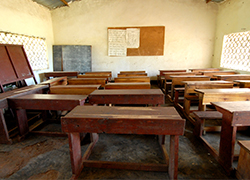Empowering Young Women in Malawi
Researchers: Craig McIntosh (GPS), Sarah Baird (George Washington University), and Berk Ozler (World Bank)
Location: Malawi
 This project aims to understand the long-term impacts of a conditional cash transfer program in Malawi on a variety of outcomes ranging from labor market outcomes to marital choice to investments in children.
This project aims to understand the long-term impacts of a conditional cash transfer program in Malawi on a variety of outcomes ranging from labor market outcomes to marital choice to investments in children.
The Schooling, Income, and Health Risk (SIHR) program, which ended in 2012, was a cluster randomized controlled trial that assessed the effects of providing school-age girls (and their parents) with cash transfers on a wide range of outcomes while varying key policy design parameters, such as conditionality, transfer size, and the recipient of the transfers within households.
One question of particular interest is whether this intervention led to changes in self-esteem and aspirations, thus empowering these young women to make different decisions about their future. The research team collected qualitative data from semi-structured, in-depth interviews with approximately 50 randomly sampled core respondents, as well as focus groups with other young women in the area. The qualitative data collection will complement and supplement the experimental survey-based investigation of empowerment and help us understand the channels through which the conditional cash transfer program is having its impact.
Measuring the effects of a cash-transfer program on outcomes such as aspirations and empowerment is critical for a number of reasons. First, cash transfers are one of the most widely touted new policy interventions, and Sub-Saharan Africa is likely to see a major expansion in such programs over the next decade.
Second, despite the large impacts of the program on critical outcomes such as learning (measured by achievement tests), the majority of the young women in the study will never go on the formal labor market and hence the standard tool to understand returns to these attributes are not available.
Finally, a new empirical literature is demonstrating the fascinating interplay between schooling, aspirations, empowerment and long-term welfare for questions as diverse as child sponsorship and the relationship between fatalism and credit demand.
Related Publications
Baird, Sarah, Francisco Ferreira, Berk Ozler, and Michael Woolcock. 2014. "Conditional, Unconditional, and Everything in Between: A Systematic Review of the Effects of Cash Transfer Programs on Schooling Outcomes." Journal of Development Effectiveness 6 (1): 1–43.
Baird, Sarah, E. Chirwa, Craig McIntosh, and Berk Ozler. 2010. "The Short Term Impacts of a Schooling Conditional Cash Transfer Program on the Sexual Behavior of Young Women." Health Economics 19 (S1): 55–68.
Baird, Sarah, Craig McIntosh, and Berk Ozler. 2011. "Cash or Condition? Evidence from a Cash Transfer Experiment." Quarterly Journal of Economics 126 (4): 1709–53.

